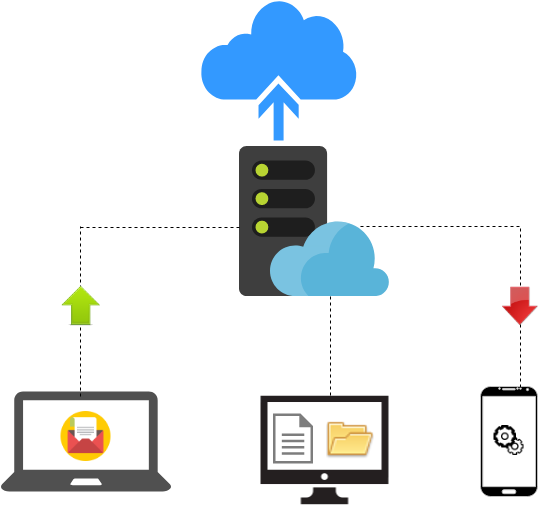
As the data is increasing exponentially across the globe, more and more organizations are turning to cloud for their backup solution. Compared to the traditional method of managing tape library in the offsite, cloud offers better scalability.
Amazon Web Services offers versatile storage services, networking options, and data transfer methods, durability, and security. Every enterprise needs a unique architecture for their back up solutions depending on the nature of data, current IT infrastructure, and industry standards.
AWS Backup Storage Services
The two key platforms that are designed for backup and archiving is Amazon S3 and Amazon Glacier. Both Amazon S3 and Amazon Glacier offer unlimited capacity as the data sets grow. Organizations maintain the copy of data in the cloud by archiving it until the retention policy is expired. Regulatory and compliance requires unchanging data storage, with checks and controls for data integrity.
- Amazon S3 Standard: This is used to store the data is being accessed frequently and offers 5GB of storage for the one year.
- Amazon S3 IA: If you have the data that you access less frequently and need immediate access when you try to retrieve it then Amazon’s S3 IA is the best option.
- Amazon Glacier: If you have the data that you access less frequently and ready to wait for 3-5 hours before it is available for access, then consider Amazon Glacier. For long-term data archiving Amazon Glacier offers extremley low cost compared to S3 IA. You can also use lifecycle management to automatically archive the data from the Amazon S3 to Glacier once the data ages.
AWS EC2 Backup and Recovery

Before moving to the cloud, enterprises are likely to have a single master backup server and a single or multiple storage servers. You can protect the on-premises servers and storage services from possible disaster by moving your master backup server to Amazon’s EC2 instance.
The data in the EC2 will be automatically backed up every day by capturing snapshots and storing in the S3. And in the event of any disaster, the snapshots can be easily used to create a volume and launch the new EC2 instance in no time.
AWS Backup in Hybrid Cloud
If the organization is running a hybrid cloud environment, then you can use the Amazon’s Storage Gateway. AWS offers a virtual appliance to install in your on-premises hypervisor creating a virtual gateway to take the backup by creating a virtual tape library. For this to work, you should have a local storage drive and a supported hypervisor (Microsoft Hyper-V or VMware).
Advantages of Using AWS Backup
Let’s go through the several benefits of using AWS backup :
- Infrastructure: AWS holds the cloud infrastructure across the world. They have 16 geographical region and 42 availability zones spread throughout the globe. A single region consists of one or more Availability Zones to provide higher application availability.
- Data Durability: AWS provides 99.99999999999% of durability for the data stored in the S3 and Glacier. The data stored in AWS cloud are stored across at least three devices in a single AWS region.
- Flexibility and Scalability: Compared to on-premises scalability such as waiting several weeks to acquire new disks, tapes, and other IT resources to increase storage infrastructure, you can scale in few minutes in AWS Cloud. The ability to scale on demand improves flexibility, agility, and innovation.
- Cost: AWS offers a pay-as-you-go cost model with no upfront fees, long-term contracts or termination fees. With these features, you can protect data in the cloud and still save money.
- Backup for All Data Types: In AWS cloud you can back up all types of data. Their storage services for an object (Amazon S3 and Amazon Glacier), file (Amazon Elastic File Service), and block (Amazon Elastic Block Storage) support industry-leading scalability, availability, durability, and security.
- Security and Compliance: With the fine-grained security you can control who can access the data in the S3 by managing access. Additionally, you can encrypt the data, detect irregular activity, and perform audits with the AWS Security Services. Also, you can meet all of your regulatory requirements by maintaining compliance programs.
- Data Transfer: You can optimize the data transfer over the internet by using Amazon Direct Connect and S3 Transfer Acceleration. Also, you can move petabytes to exabytes of data offline using AWS Snowball, AWS Snowmobile, and AWS Snowball Edge.
With all the above advantages, AWS offers the best cloud backup solution for the public cloud and save data the data securely.
About InterPole
InterPole was established in 1996 and engages in web hosting, email, and management of IT infrastructure. InterPole pioneered with Virtual Private Servers in 2004 and Cloud Hosting in 2008. Over the years, InterPole has worked with over 6200 mid-sized businesses and startups, and have assisted them in their journey towards the adoption of modern technologies through the Internet. InterPole is a Standard Consulting Partner of Amazon AWS and Microsoft Azure. With this partnership, provides Managed AWS service and maintains a team of engineers who are trained and certified for the specific cloud platforms. These benefits companies in defining their cloud strategy and making a well-planned journey, reliably and cost-effectively.

